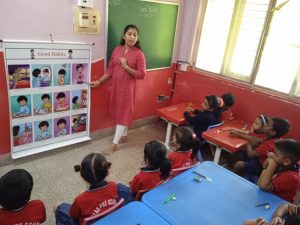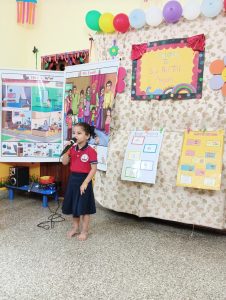Learning Through Play: The Importance of Play in Early Childhood Education and Development
In the realm of early childhood education, the phrase “learning through play” has become a cornerstone of pedagogical philosophy and practice. As an essential component of cognitive, social, emotional, and physical development, the role of play in learning for kids cannot be overstated. In this blog post, we will explore how play fosters developmental milestones in young children, backed by pertinent statistics, diverse perspectives, and an illustration of how Vikas Preschool integrates these principles into its educational framework.

The Significance of Play in Early Childhood Education
Play is not merely an engaging activity for children; it is a vital educational tool that facilitates rich learning experiences. According to the American Academy of Pediatrics, play has been recognized as a crucial component of learning that fosters creativity and critical thinking skills. Through various forms of play—be it imaginative, constructive, or cooperative—children gain hands-on experiences that promote exploration, problem-solving, and social interaction.
Cognitive Benefits
Research indicates that children who engage in play-based learning demonstrate enhanced cognitive skills. A study published in the journal Early Childhood Research Quarterly found that structured play environments led to significant improvement in children’s language skills and executive functioning. In fact, children who regularly participated in play-based learning showed a 30% increase in their language proficiency compared to those with traditional instruction methods (McClowry, 2017).

Social and Emotional Development
Play not only stimulates cognitive growth but also fosters social and emotional development. According to the National Association for the Education of Young Children (NAEYC), through play, children learn to negotiate, share, and resolve conflicts—skills crucial for building healthy relationships. For instance, a study from the University of California, Berkeley, indicates that children exposed to social play exhibited higher levels of empathy and improved emotional regulation (Ginsburg, 2007).
Physical Development
In addition to cognitive and social skills, play contributes to the physical development of children. Whether through active play in outdoor settings or fine motor skills developed through arts and crafts, play is integral to the advancement of gross and fine motor skills. The Centers for Disease Control and Prevention (CDC) emphasizes that physical activity in early childhood is associated with improved cardiovascular fitness, bone health, and enhanced coordination skills (CDC, 2020).
Implementing Play in Educational Settings
Understanding the multifaceted benefits of play, many preschools, such as Vikas Preschool, focus on incorporating play-based learning strategies into their curricula. These strategies aim to create a rich learning environment where children can thrive emotionally, socially, and academically.
Vikas Preschool: A Model of Learning Through Play
Vikas Preschool takes a proactive approach to early childhood education by embedding play into their learning framework. Here are some ways in which Vikas Preschool promotes learning through play:
- Structured Play Environments: Vikas Preschool designs its classrooms and outdoor spaces to facilitate various types of play, such as imaginative play, group activities, and interactive learning games. This approach allows children to explore freely while still focusing on educational objectives.
- Curriculum Integration: The curriculum at Vikas Preschool integrates core subjects with playful activities. For example, children can explore mathematical concepts through building blocks or enhance their literacy skills through storytelling activities, weaving learning seamlessly into play.
- Social Interaction: The preschool encourages cooperative play, enabling children to work together to achieve common goals. This not only enhances their social skills but also lays the foundation for teamwork and collaboration—skills essential in later life.
- Parental Involvement: Vikas Preschool actively involves parents in the learning process, encouraging them to partake in play-based activities at home. This collaborative connection between home and school provides continuity in learning and reinforces the significance of play in development.
- Diversity and Inclusivity: Understanding the diverse backgrounds of its students, Vikas Preschool incorporates multicultural elements into its play activities. This educational approach promotes inclusivity and respect for different cultures, helping children appreciate diversity from an early age.
Diverse Perspectives on Learning Through Play
While the benefits of play in early childhood education are widely recognized, perspectives on how best to implement play-based learning may vary. Some educators believe in a more structured approach to play, emphasizing specific learning outcomes. Others advocate for child-led exploration, where children’s interests dictate the learning process. Each perspective offers valuable insights into how play can be optimized for educational benefit.
Challenges
Though the merits of play are numerous, challenges do arise. For example, the increasing focus on standardized testing may limit opportunities for play-based learning. Furthermore, not all educational settings are equipped with resources to prioritize play in learning. It is essential for educators, policymakers, and parents to advocate for play as an important educational strategy.
Conclusion
In summary, learning through play is fundamental to early childhood education and development. The cognitive, social, emotional, and physical benefits associated with play make it an invaluable component of effective learning for kids. Vikas Preschool exemplifies an institution committed to nurturing these attributes through its innovative, play-based curriculum.
As the body of research surrounding early childhood education continues to grow, embracing the philosophy of learning through play can ensure that future generations are equipped with the skills necessary to thrive in an ever-changing world.
References
- American Academy of Pediatrics. (n.d.). “The Importance of Play in Promoting Healthy Child Development.”
- Centers for Disease Control and Prevention (CDC). (2020). “Physical Activity Facts.”
- Ginsburg, K. (2007). “The Importance of Play in Promoting Healthy Child Development and Maintaining Strong Parent-Child Bonds.”
- McClowry, S. G. (2017). “Play and Learning in Early Childhood.” Early Childhood Research Quarterly.
By leveraging the power of play, parents, educators, and community members can collectively work toward fostering an enriching environment that prioritizes the holistic development of every child.
